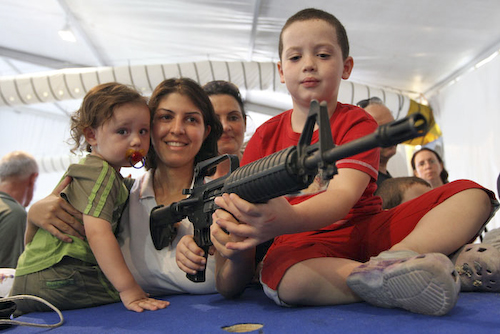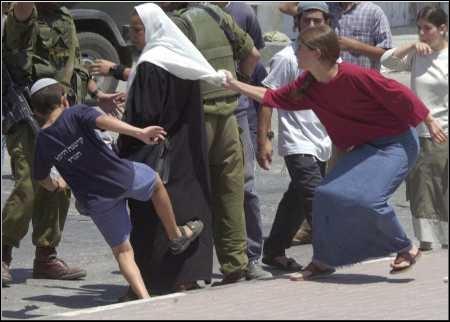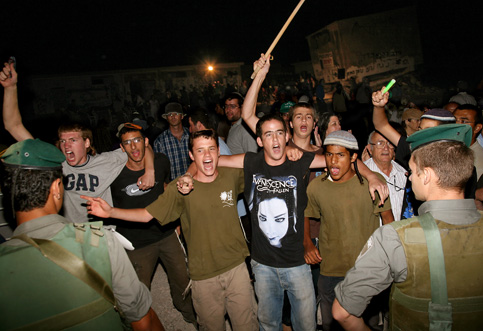Haaretz is de Israëlische krant, in het engels, die het meest gelezen wordt door geïnteresseerde buitenlanders. De engelse versie zit bij de Herald Tribune gevouwen, en wordt ook regelmatig gelezen op het net. Ik ga er elke dag even langs. Haaretz geldt als de meest progressieve krant in Israel. Het is in ieder geval de meest ‘liberale’, naast de artikelen van Amira Hass (die al een tijdje niet voor Haaretz heeft geschreven) Gideon Levy en Akiva Eldar, de meest kritische verslaggevers waarvan Levy en Hass ongeveer de enige journalisten zijn die stelselmatig de Palestijnse kant bezoeken en daarover schrijven, verschijnen ook uitermate rechtse artikelen, bijvoorbeeld van Israel Harel, van de kolonistenbeweging. Onlangs beklaagde hij zich er in Haaretz over dat die arme kolonisten gedemoniseerd worden, en niet meer kunnen rekenen op de bescherming van de Iasraelische overheid als ze aangevallen worden door agressieve Palestijnen. Hier. Een fraaie omdraaiing van de werkelijkheid. Hieronder een woedende reactie van Gideon Levy.
Yes, hate
By Gideon Levy
My settler colleague, Israel Harel, his community’s champion at rolling his eyes, playing innocent and speaking with a honeyed tongue, is once again grieving and playing the victim. In a column published here last week (“Have we become Sodom?” October 23), he complained that the reason for what he termed destructive criticism of the settlers is hatred. And indeed, Mr. Harel, this time, you’re right: Large segments of Israeli society do indeed hate. But this is not baseless hatred, not hatred for the sake of hatred, to use your words. It is hatred for your enterprise. You have earned this hatred honestly – the only honest thing about your enterprise.
Yes, there are Israelis who do not want to see their countrymen despoiling the vineyards and burning the fields of poor farmers. Yes, there are Israelis who do not want to see troops of masked settlers beating elderly shepherds with clubs. Yes, there are Israelis who do not want to see other Israelis sicking their dogs on and puncturing the tires of the soldiers who protect them. Yes, there are Israelis who are embarrassed by the fact that tens of thousands of their fellow Israelis live on privately owned lands that were robbed, stolen and extorted, both in broad daylight and under cover of darkness.
And yes, there are Israelis who think that you have brought disaster upon us, a tragedy that will last for generations. That via your actions, you have brought wars and bloodshed and the brutalization of society upon us. That if you were not there, none of us would be there any longer, in a land that is not ours. That just as we withdrew from occupied South Lebanon – solely because, fortunately, you were not there – we would also long since have been able to withdraw from the areas you have occupied. Yes, there are Israelis who hate all this.
Harel complains about the fact that Israeli society is angry at the settlers as a collective. Unfortunately, he does not get out enough, for their enterprise is flourishing. Every class and institution of Israeli society defends the settlements, finances them from its own pockets, and is a full partner in the theft, even if some of them are disgusted by it. The collective guilt is justified: Every settler and every settlement is equal. There are no illegal outposts and legal settlements – they are all illegal, according to both international law and universal justice, which have no need of legal sophistries. There are also no moderate and extremist settlements: No one who chooses to live in occupied land is a moderate.
And now for the playing innocent part: There are “some young men,” Harel writes, just “a few dozen youths,” who attack Arabs. Harel says that he, like most of his colleagues, “cannot understand” this. He has already told them, during a “heated discussion,” that “this is not my halakha.” And he goes on to say that his fists clench when he sees violence against the elderly in Haifa and Tel Aviv or gang rapes in Ramat Hasharon. But in Ramat Aviv Gimmel people do not ask what values were instilled in these youth, Harel writes; there, it is just juvenile delinquency. Yet when the same thing happens among settlers, the guilt is collective.
So here is the real difference: Secular society denounces and rejects those who rob the elderly and rape young girls. The perpetrators are given a fair trial, they receive lengthy sentences, and both the media and secular society ostracize them totally.
But what happens in your community? Have you ever heard, Israel, of a single settler who filed a complaint with the police against another settler over a rampage against Arabs? After all, you, too, see the rioters every day, on the road from Ofra – much of whose land, incidentally, is private land that was stolen. And what do you do when you see those rioters? Have another “heated discussion”? When we see people who assault the elderly, we call the police. Do you?
And if such a thing were to happen, how would your aggressive society treat the “informers”? After all, people who have dared to voice even a hint of “moderation” in their positions – and we are not even talking about anything as drastic as a complaint to the police – have been forced to abandon the settlements where they lived for fear of vengeance. It is not the lawbreakers who are ostracized in your community, but those who try to denounce them. Look at what happened to Rabbi Yoel Bin Nun – with no ostracism and no denunciation, other than laughable lip service. Only on the day when the settlement leadership starts cooperating with the law enforcement agencies will I believe you that those “few dozen youths,” who are in fact a large and violent army of thousands, are indeed loathed by you.
You must admit the truth: To you, they are the pioneers who go before the camp, the ones who stand at the forefront. They are the ones who are realizing what your generation tried and failed to do in its day. In the deepest recesses of your souls, your hearts go out to them.
You spoke with Benny Katzover and Elyakim Ha’etzni, and they told you that the main opposition to the olive harvest stemmed from “security worries”? Had you not stolen the harvesters’ lands, there would be no security risk. And after you have taken over their lands, you dare to justify the theft of what little remains to them on the grounds of security – your security only, of course? Evidently, chutzpah also has no limits.
And finally, the punch line: Harel writes that people like him will soon be hunkering down in bunkers due to the “unbridled” events in commemoration of Yitzhak Rabin’s assassination. It is not the murder or the events leading up to it that were unbridled, but the commemorations? It is not we who have all been in bunkers for 40 years because of you, but you, the robbed Cossacks? That is already one sentence too many – perhaps even for your too numerous fans.



